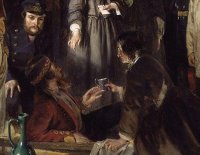This is the second post in the series on Henry Drummond's essay on love. He has established that love has a good claim to be the greatest thing there is, now he sets out to show how it fulfils Old Testament law.
 He begins by quoting Paul from Romans and asking us what we think Paul meant. Then he sets out to answer his own question.
He begins by quoting Paul from Romans and asking us what we think Paul meant. Then he sets out to answer his own question.Paul makes a deeply significant remark elsewhere, “Love is the fulfilment of the law.” (Romans 13:9-10). Have you ever wondered what he meant? In those days people worked their passage to heaven by keeping the ten commandments (and the hundred and ten other commandments which they had made from them). But Christ came and said, “I will show you a simpler way. If you do one thing, you will do these hundred and ten things without ever thinking about them. If you love, you will unconsciously fulfil the entire law.” (For example, Matthew 22:37-40).
Drummond shows clearly that not only did Paul make this claim, so too did Jesus himself. The reference to the 110 other commandments is to the rules created by the teachers of the Law as fences. The idea was that because (for example) the Law says it is wrong to boil a calf in its mother's milk, to avoid all risk of a piece of meat coming in contact with a piece of cheese that might inadvertantly have been made from the mother's milk, a house must have two kitchens - one for milk products and the other for meat. In this way the risk of breaking that particular law would be greatly reduced.
Next, Henry Drummond provides some examples of how exactly love can cause the law to be fulfilled. He demonstrates its truth for the Almighty and then also for the people we meet in our lives.
It's easy to see why this is true. Take any of the commandments, for example, “You shall have no other gods before me.” (Exodus 20:3). If a person loves God you won't need to remind them of that. Love fulfils that law. “You shall not misuse the name of the Lord your God.” (Exodus 20:7). Would anyone dream of misusing his name if they loved him? “Remember the Sabbath day by keeping it holy.” (Exodus 20:8). Wouldn't anyone be glad to have one day in seven to dedicate more fully to the one they love? Love fulfils all these laws regarding God.
In just the same way, if someone loves other people there would be no need to remind them to honour their parents, they could do nothing less! It would be preposterous to tell them not to kill. And suggesting they should not steal would be to insult them – how could they steal from people they love? What point would there be in persuading them not to bear false witness. That's the last thing they'd do to those they love. You'd never think to press such a person to avoid envying their neighbour's possessions. They'd prefer the neighbour to have them anyway! And that is how “love is the fulfilment of the law”. It's the one rule for fulfilling all rules, the one new command for meeting all the old commandments, Christ's one secret of the Christian life.
And finally Henry Drummond sets the scene for the rest of his essay. He shows that 1 Corinthians 13 falls into three natural parts. He lists them here before launching into a treatment of each one.
Paul understood the secret clearly and in this wonderful chapter he's given us the best existing description of the Greatest Good. It can be divided into three parts. In verses 1-3 he contrasts love with other great things, in verses 4-7 he analyses its components, and in verses 8-13 he defends love as the greatest gift.
Henry Drummond is surely right. If love was always central in my heart it would always be central in my actions too. There's a certain inevitability about that.
< What is the greatest gift? | Index | Love and other things >

